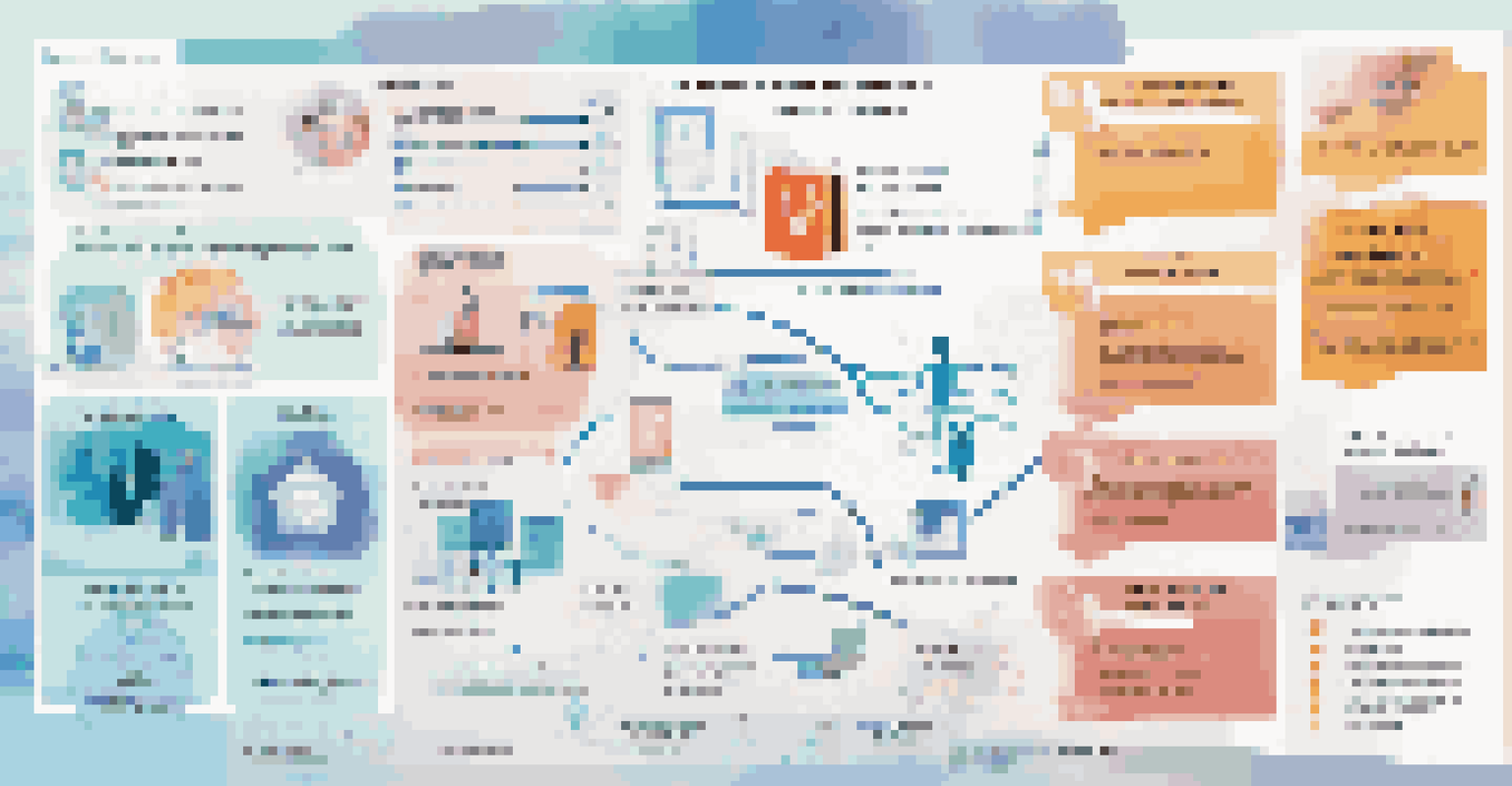How EHRs Enhance Patient Education and Self-Management Tools

Understanding Electronic Health Records (EHRs) and Their Role
Electronic Health Records (EHRs) are digital versions of patients' paper charts. They provide real-time, patient-centered records that make information available instantly and securely to authorized users. This technology facilitates better coordination of care and enhances communication between patients and healthcare providers.
In the rapidly changing landscape of healthcare, electronic health records not only streamline patient data but also empower patients to take control of their health journey.
EHRs contain a wealth of information, including medical history, diagnoses, medications, treatment plans, and test results. By consolidating this data in one place, EHRs enable healthcare professionals to make informed decisions quickly. This not only streamlines workflows but also reduces the likelihood of errors in patient care.
Moreover, EHRs can serve as a powerful tool for patient education by making relevant information accessible. Patients can view their health data, learn about their conditions, and understand their treatment options, all of which can empower them to take an active role in their health management.
Enhancing Patient Engagement Through EHRs
Patient engagement is crucial for effective healthcare, and EHRs play a significant role in this aspect. With features like patient portals, individuals can access their health information anytime, anywhere. This level of transparency encourages patients to participate actively in their care and decision-making processes.

EHRs also allow for personalized communication between healthcare providers and patients. For instance, providers can send tailored educational materials directly through the portal based on a patient's specific health needs. This personalized approach can make learning about health conditions feel more relevant and engaging.
EHRs Enhance Patient Engagement
Electronic Health Records empower patients by providing access to their health information and facilitating active participation in their care.
Furthermore, by having access to their health information, patients can track their progress and monitor their conditions more effectively. This not only boosts their confidence but also fosters a sense of ownership over their health, which is essential for successful self-management.
Providing Access to Educational Resources via EHRs
One of the standout features of EHRs is their ability to house a variety of educational resources. Patients can access articles, videos, and other materials that explain their conditions, treatments, and healthy lifestyle choices. This wealth of information can demystify complex medical jargon and empower patients to make informed decisions.
The greatest benefit of EHRs is their ability to engage patients in their own care, transforming them from passive recipients to active participants.
Moreover, EHR systems can be tailored to include specific educational content relevant to different patient demographics. For example, a patient diagnosed with diabetes might receive links to resources about diet, exercise, and blood sugar monitoring. This targeted approach ensures patients receive the information they need most.
By making education readily available, EHRs help bridge the gap between medical advice and patient understanding. When patients are better informed, they are more likely to adhere to treatment plans and adopt healthier lifestyles.
The Role of Reminders and Alerts in Self-Management
EHRs are equipped with reminder systems that can significantly enhance patient self-management. These reminders can prompt patients to schedule appointments, take medications, or perform routine health checks. This proactive approach helps patients stay on track with their health goals.
Alerts can also notify patients about important health screenings or vaccinations based on their medical history. This ensures that they don't miss crucial preventive care opportunities. For example, a patient nearing the recommended age for a colonoscopy may receive an alert to discuss this with their provider.
Personalized Support Through EHRs
EHRs offer tailored educational resources and reminders that help patients manage their health more effectively.
Additionally, these reminders can be personalized to fit each patient's unique health journey. This level of customization can improve adherence to treatment plans and ultimately lead to better health outcomes.
Facilitating Remote Monitoring and Telehealth Services
EHRs play a pivotal role in facilitating remote monitoring and telehealth services, which have become increasingly important in modern healthcare. Patients can use wearable devices that sync with their EHRs to track vital signs like heart rate or blood pressure. This real-time data can be invaluable for both patients and providers in managing chronic conditions.
Telehealth services, integrated within EHR systems, allow patients to consult with healthcare providers from the comfort of their homes. This accessibility is especially beneficial for those with mobility issues or those living in remote areas. By reducing barriers to care, EHRs encourage patients to seek help when needed.
Moreover, having all health data in one place ensures that healthcare providers have the most accurate and up-to-date information during virtual visits. This comprehensive view fosters better communication and more effective treatment plans tailored to individual patient needs.
Improving Communication Between Patients and Providers
Effective communication between patients and healthcare providers is fundamental to successful treatment outcomes. EHRs streamline this communication by providing secure messaging features that allow patients to ask questions, request prescription refills, or discuss concerns directly with their providers. This instant communication fosters a stronger patient-provider relationship.
Additionally, EHRs often include a summary of the patient’s visit that can be shared with them after the appointment. This summary serves as a helpful reference, allowing patients to recall important information discussed during their visit. For many, having this written record can clarify next steps in their care.
EHRs Improve Communication
By streamlining communication between patients and providers, EHRs foster stronger relationships and reduce misunderstandings in care.
By enhancing communication, EHRs reduce misunderstandings and promote a collaborative approach to healthcare. When patients feel heard and informed, they are more likely to engage with their treatment plans and follow through on recommendations.
The Future of EHRs in Patient Education and Self-Management
As technology continues to evolve, the future of EHRs holds exciting possibilities for patient education and self-management tools. Innovations like artificial intelligence and machine learning could provide even more personalized educational content and tailored health recommendations based on individual patient data. This could revolutionize how patients manage their health.
Furthermore, integrating social networking features within EHRs could foster community support among patients with similar conditions. Sharing experiences and tips can encourage individuals to engage more actively in their self-management journeys, leading to improved health outcomes.

Ultimately, the growth of EHRs is paving the way for a more patient-centered approach in healthcare. By continually enhancing these systems, we can empower patients to take charge of their health and make informed decisions that lead to better overall well-being.